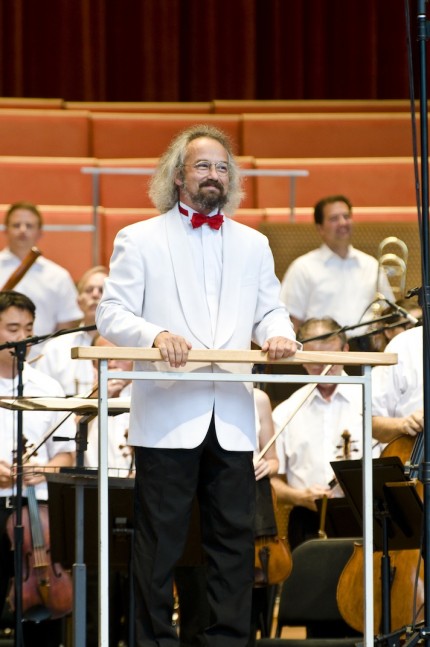Kalmar, Grant Park Orchestra serve up superb night of Adams and Shostakovich

There is a great thesis waiting to be written about why John Adams and Dmitri Shostakovich make such companionable program mates.
The free-wheeling American composer may initially seem light years removed stylistically from the depressive Russian yet the music of both men share a certain quirky anarchic quality as well as a similar rhythmic insistence and explosive vitality.
The penultimate program of the Grant Park Music Festival’s season paired works of both composers Wednesday night at the Pritzker Pavilion in a concert led by Carlos Kalmar.
Kalmar is such a convincing interpreter of American music in all its widely variegated manifestations, that his versatility can get taken for granted.
It shouldn’t. Wednesday’s performance of Adams’ suite, The Chairman Dances — drawn from his celebrated opera, Nixon in China —offered a virtual seminar in how to handle Adams’ deceptively challenging music. Kalmar pointed the Minimalist pulsing surely yet flexibly, segueing gracefully into Madame Mao’s foxtrot, underlining the shifting rhythmic ingenuity, as well as bringing out the wry humor. Kalmar’s dexterous balancing allowed Adams’ piquant scoring to register, particularly in the long slow fade to piano and light percussion.
Shostakovich’s Symphony No. 10 offered a weightier conclusion to the evening. The Tenth is arguably, the finest of Shostakovich’s fifteen symhonies, charting the progress from oppressed indolence through satire to a boisterous and optimistic conclusion (one more convincing than the massively hollow coda of the Fifth Symphony).
Written in 1953 after the death of Stalin, there is characteristic darkness in this music but also palpable relief and a sense of Shostakovich giving vent to the exorcising of personal and political demons. From the opening pages of the slow introduction — aided by notably rich and burnished playing from the cellos and basses — Kalmar led a spacious, concentrated performance. The sense of the composer — and the country — rousing himself out of bleak desolation to a more assertive energy was manifest with an aptly strident and jarring power to climaxes. Kalmar drew a striking degree of dynamic nuance and detailed coloring considering the al fresco venue, even when temporarily threatened by a hovering helicopter.
The second movement — Shostakovich’s sardonic musical portrait of Stalin — has all due malign energy and motoric momentum. The Allegretto is one of the composer’s ambivalent slow movements, a lightly ironic yet uneasy waltz with the composer’s musical signature to the fore, aided by superbly evocative horn solos by Jonathan Boen.
In the finale, Kalmar’s dwelling on the lugubrious darkness of the Andante introduction underlined the ensuing release from the bleakness, with the exhilaration of the whirlwind main theme leading to a blazing coda.
Even by their standards, the Grant Park musicians excelled Wednesday night in this superb Shostakovich performance with especially fine contributions from clarinetist Charlene Zimmerman, flutist Mary Stolper, bassoonist Eric Hall, hornist Boen and concertmaster Ilana Setapen.
The Grant Park Music Festival closes its season this weekend with two performances of Verdi’s Requiem 6:30 p.m. Friday and 7:30 p.m. Saturday at the Pritzker Pavilion. Admission is free. grantparkmusicfestival.com
Posted in Performances




